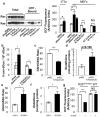Oncogene-induced Nrf2 transcription promotes ROS detoxification and tumorigenesis
- PMID: 21734707
- PMCID: PMC3404470
- DOI: 10.1038/nature10189
Oncogene-induced Nrf2 transcription promotes ROS detoxification and tumorigenesis
Abstract
Reactive oxygen species (ROS) are mutagenic and may thereby promote cancer. Normally, ROS levels are tightly controlled by an inducible antioxidant program that responds to cellular stressors and is predominantly regulated by the transcription factor Nrf2 (also known as Nfe2l2) and its repressor protein Keap1 (refs 2-5). In contrast to the acute physiological regulation of Nrf2, in neoplasia there is evidence for increased basal activation of Nrf2. Indeed, somatic mutations that disrupt the Nrf2-Keap1 interaction to stabilize Nrf2 and increase the constitutive transcription of Nrf2 target genes were recently identified, indicating that enhanced ROS detoxification and additional Nrf2 functions may in fact be pro-tumorigenic. Here, we investigated ROS metabolism in primary murine cells following the expression of endogenous oncogenic alleles of Kras, Braf and Myc, and found that ROS are actively suppressed by these oncogenes. K-Ras(G12D), B-Raf(V619E) and Myc(ERT2) each increased the transcription of Nrf2 to stably elevate the basal Nrf2 antioxidant program and thereby lower intracellular ROS and confer a more reduced intracellular environment. Oncogene-directed increased expression of Nrf2 is a new mechanism for the activation of the Nrf2 antioxidant program, and is evident in primary cells and tissues of mice expressing K-Ras(G12D) and B-Raf(V619E), and in human pancreatic cancer. Furthermore, genetic targeting of the Nrf2 pathway impairs K-Ras(G12D)-induced proliferation and tumorigenesis in vivo. Thus, the Nrf2 antioxidant and cellular detoxification program represents a previously unappreciated mediator of oncogenesis.
©2011 Macmillan Publishers Limited. All rights reserved
Figures




Comment in
-
Cancer: when antioxidants are bad.Nature. 2011 Jul 6;475(7354):43-4. doi: 10.1038/475043a. Nature. 2011. PMID: 21734699 No abstract available.
-
Tumorigenesis: oncogene detox programme.Nat Rev Cancer. 2011 Jul 22;11(9):622-3. doi: 10.1038/nrc3119. Nat Rev Cancer. 2011. PMID: 21779002 No abstract available.
-
NrF2 ⁄Keap1 as gatekeepers of redox homeostasis – do they prevent or cause cancer?Pigment Cell Melanoma Res. 2011 Dec;24(6):1078-9. doi: 10.1111/j.1755-148X.2011.00913.x. Pigment Cell Melanoma Res. 2011. PMID: 22216435 No abstract available.
References
-
- Shibutani S, Takeshita M, Grollman AP. Insertion of specific bases during DNA synthesis past the oxidation-damaged base 8-oxodG. Nature. 1991;349:431–434. - PubMed
-
- Wakabayashi N, et al. Keap1-null mutation leads to postnatal lethality due to constitutive Nrf2 activation. Nat Genet. 2003;35:238–245. - PubMed
-
- Venugopal R, Jaiswal AK. Nrf2 and Nrf1 in association with Jun proteins regulate antioxidant response element-mediated expression and coordinated induction of genes encoding detoxifying enzymes. Oncogene. 1998;17:3145–3156. - PubMed
Publication types
MeSH terms
Substances
Grants and funding
- R01 CA128920/CA/NCI NIH HHS/United States
- U01 CA111294/CA/NCI NIH HHS/United States
- P50 CA062924/CA/NCI NIH HHS/United States
- CA106610/CA/NCI NIH HHS/United States
- CA101973/CA/NCI NIH HHS/United States
- K08 CA106610/CA/NCI NIH HHS/United States
- U01 CA105490/CA/NCI NIH HHS/United States
- CA128920/CA/NCI NIH HHS/United States
- CA105490/CA/NCI NIH HHS/United States
- CA111294/CA/NCI NIH HHS/United States
- CA62924/CA/NCI NIH HHS/United States
- F32 CA123887/CA/NCI NIH HHS/United States
- U01 CA084291/CA/NCI NIH HHS/United States
- CA084291/CA/NCI NIH HHS/United States
- CRUK_/Cancer Research UK/United Kingdom
- R01 CA101973/CA/NCI NIH HHS/United States
LinkOut - more resources
Full Text Sources
Other Literature Sources
Medical
Molecular Biology Databases
Research Materials
Miscellaneous

